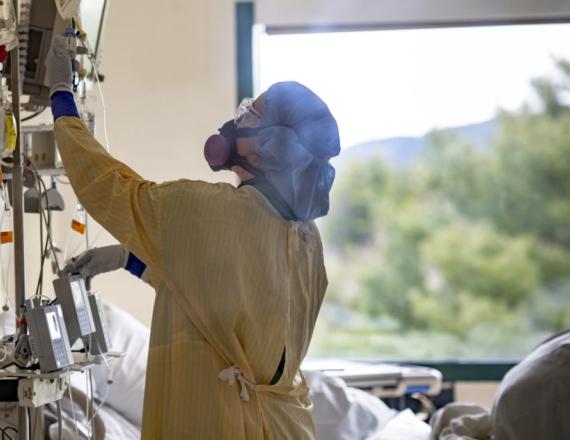COVID-19 Research Benefits Patients and Contributes to Science
Staff at Dartmouth-Hitchcock Medical Center (DHMC) were battling COVID-19 on two fronts in March 2020. Locally, they were treating patients and preparing for a potential surge in cases; and globally, they were opening DHMC as one of the first 20 sites worldwide participating in a clinical trial of remdesivir, an anti-viral medicine. Remdesivir was used during the West African Ebola virus epidemic from 2013-16 and showed promise against Severe Acute Respiratory Syndrome (SARS) and Middle East Respiratory Syndrome (MERS).

COVID-related research is a top priority for our organization. As an academic medical center we have the tools to address this evolving situation and offer important options for our patients.”
In what can typically take 60 days or more, a team of experts in research operations and investigators opened the two Phase III therapeutic studies in a remarkable six days. The first trial is for those with moderate symptoms of COVID-19, and the second trial is for those with severe, advanced symptoms. Both trials are intended to prevent progression of the disease.
“COVID-related research is a top priority for our organization,” says Leigh Burgess, vice president of Dartmouth-Hitchcock’s Research Operations, who notes that as of May 1 there are over 20 studies related to COVID-19 treatment or testing either open or in the process of opening at DHMC. “As an academic medical center we have the tools to address this evolving situation and offer important options for our patients.”
“In the setting of a pandemic where there are no proven treatments or well-validated diagnostic tests, clinical research is absolutely necessary to ensure that we do the best for our patients while contributing to medical science,” says principal investigator Richard Zuckerman, MD, MPH, director of Dartmouth-Hitchcock’s Transplant and Immunocompromised Host Program, program director for the Infectious Disease Fellowship, and associate professor of medicine at the Geisel School of Medicine. “The research operation at DHMC recognized this immediately, responded rapidly, and has worked very closely with the clinical teams managing our patients so that we can assist in the regional and global efforts to define the best care for COVID-19.”
These Phase III studies at multiple sites are gathering information about safety and effectiveness by studying different populations and different treatment durations, as well as using the drug in combination with other supportive care. Based on early data from remdesivir trials throughout the world, the U.S. Food and Drug Administration recently approved the emergency use of the drug for patients hospitalized with severe cases of COVID-19.
“We are extremely fortunate that we’re able to be a part of the remdesivir trials,” says Zuckerman. “It is gratifying to know that our patients contributed to the research that has shown remdesivir to be the most promising antiviral agent with efficacy in improving clinical outcomes.”